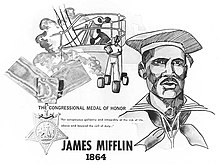James Mifflin
James Mifflin | |
|---|---|
 A U.S. Navy poster featuring Mifflin | |
| Born | 1839 Richmond, Virginia, U.S. |
| Allegiance | |
| Service | |
| Years of service | 1864 - 1865 |
| Rank | Engineer's Cook |
| Unit | |
| Battles / wars | American Civil War |
| Awards | Medal of Honor |
James Mifflin (1839–?) was a United States Navy sailor and a recipient of America's highest military decoration—the Medal of Honor—for his actions in the American Civil War.
Mifflin enlisted in the Navy from his home state of Virginia in April 1864,[1] and by August 5, 1864 was serving as an Engineer's Cook on the USS Brooklyn (1858). During the Battle of Mobile Bay, Alabama, Mifflin stood fast and performed his ammunition supply duties despite enemy shellfire. For his conduct during this battle, he was awarded the Medal of Honor.
Medal of Honor citation

Rank and Organization:
- Engineer's Cook, U.S. Navy. Born: 1839, Richmond, Va. Accredited to: Virginia. G.O. No.: 45, December 31, 1864.
Citation:
On board the U.S.S. Brooklyn during successful attacks against Fort Morgan, rebel gunboats and the ram CSS Tennessee (1863) in Mobile Bay, 5 August 1864. Stationed in the immediate vicinity of the shell whips which were twice cleared of men by bursting shells, Mifflin remained steadfast at his post and performed his duties in the powder division throughout the furious action which resulted in the surrender of the prize rebel ram Tennessee and in the damaging and destruction of batteries at Fort Morgan.[2]
See also
Notes
- ^ Civil War sailors database
- ^ "Mifflin,James, Civil War Medal of Honor recipient". American Civil War website. 2007-11-08. Retrieved 2007-11-08.
References
This article incorporates public domain material from websites or documents of the Naval History and Heritage Command.
- "James Mifflin". Claim to Fame: Medal of Honor recipients. Find a Grave. Retrieved 2007-11-08.
- "US People - Mifflin, James, Engineer's Cook, USN". Online Library. Naval History & Heritage Command. 2006-04-28. Archived from the original on 2006-12-08. Retrieved 2006-11-16.
- "Civil War Medal of Honor recipients (M-Z)". Medal of Honor citations. United States Army Center of Military History. August 3, 2009. Archived from the original on February 23, 2009. Retrieved July 1, 2010.
